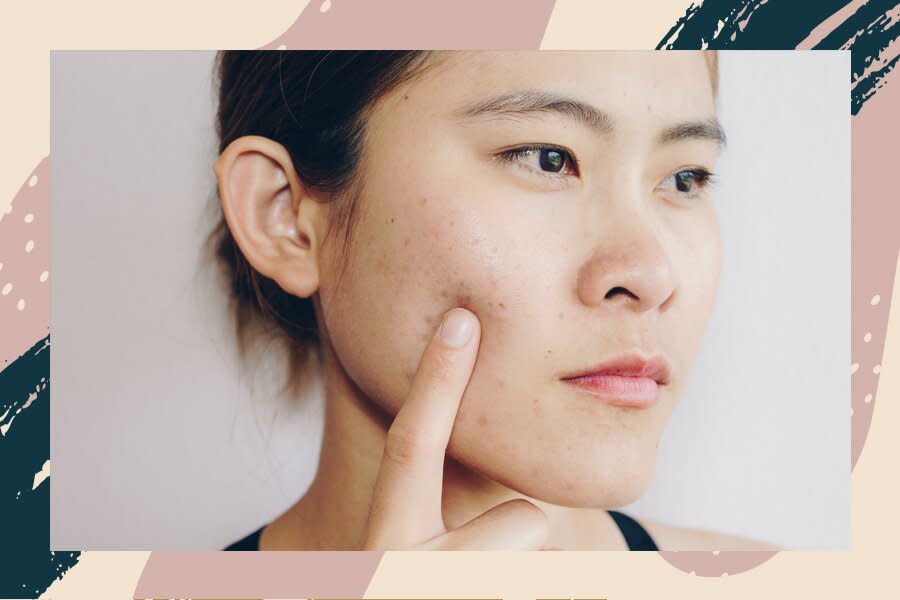There's a Reason You Get More Acne Scars in the Summer

Getty Images
'Tis the season for sky-high temps, which means that apart from swapping out sneakers for sandals, it's also the time when acne is making its appearance on, well, just about everyone. Even if your skin isn't pimple-prone, summer is prime time for breakouts and the parting gift (ahem, scarring) they leave behind. According to board-certified dermatologist Marisa Garshick, M.D., the extra heat and moisture during the summer months can cause more oil and clogged pores, which can lead to a surplus of breakouts and leave more room for scarring to rear its head if we're not careful. What's more, hyperpigmentation can darken and become more visible with sun exposure.
To find out more about what's causing your sudden onslaught of acne scars, as well as the best acne scar treatments to add to your skincare routine, we tapped Dr. Garshick and other dermatologists for some advice.
What are acne scars?
Before we get into the nitty-gritty, it's important to know that not all acne scars are created equal. In general, an acne scar refers to a mark that's left behind after a pimple heals. According to Marie Veronique, a chemist and esthetician, there are a few different types of scarring. "Atrophic scars appear as small indentations or pits in the skin and are often called 'ice pick scarring,'" she explains. Then, there are hypertrophic scars, which are raised and appear when the skin makes too many skin cells in the healing process, causing them to pile up. Finally, if you notice a thick, darker scar that's larger in size than the original acne spot, it's likely a keloid scar.
This is all not to be confused with post-inflammatory hyperpigmentation (PIH), which our experts highlight as completely different from scarring. "PIH are surface marks left on our skin post-breakout that can appear as more pink or more brown (depending on skin tone)," says Dr. Pimple Popper, aka Sandra Lee, M.D., a board-certified dermatologist and founder of SLMD Skincare. "These are not technically scars and are actually areas of melanin deposits that will eventually fade over time as your skin cells regenerate."
How your skin tone can affect scarring:
No skin tone is safe from acne scarring. Those with fair skin tend to see scars of the atrophic or hypertrophic variety and may experience redness or pinkness as the blemish heals. If you have a medium to dark skin tone (or tan easily), you're more likely to experience hyperpigmentation or keloid scarring. That's because these can "stand out quite vividly against the surrounding skin in people with darker skin tones," explains Veronique.
But here's the catch-22: Darker skin tones are more prone to scarring and also tend to be more sensitive to the aggressive treatments aimed at getting rid of it.
How the sun affects acne scars:
As it turns out, the sun is a hotbed for breakouts and scarring. "UV rays do all sorts of damage to the skin that can negatively affect existing problems with acne," says Veronique. "UVA in particular destroys immune function and increases inflammation, thus exacerbating other inflammatory conditions, such as rosacea and acne." Plus, with sun exposure, scars and hyperpigmentation have the potential to darken and appear more noticeable.
But will all sun-related acne turn into scars? Dr. Garshick says that while more superficial breakouts will likely heal without any noticeable mark, others that are deeper or more stubborn may be more likely to leave a more obvious scar behind. Also, the way you treat an active pimple can have an effect on how a (potential) scar forms.
"For the most part, the more inflammation that occurs and the more deep-seated a pimple is under the skin, the more there's a risk for scarring," explains Dr. Lee. "This is why it is important that you do not try to extract inflammatory pimples without the help of a professional and why everyone knows they shouldn't pop their pimples."
How to heal summertime acne scars:
One preventative measure for acne scars? Using non-comedogenic products, for starters. Wearing products—SPF included—that clog pores can cause more congestion and, thus, more acne. Add sweat to the equation and you're left with more bacteria, which leads to more chances for congested pores to become infected and erupt into a breakout—all of which can lead to eventual scarring. Here's our expert-approved guide to keep acne scars at bay.
1. Look for skin-brightening ingredients

Shop it! $48, Amazon.com
"In general, darker skin tones should look for ingredients that help to lighten the dark spots, such as kojic acid, retinol, or hydroquinone," says Dr. Garshick. She recommends this pigment gel, which contains a combination of hydroquinone, kojic acid, and azelaic acid to help lighten dark spots associated with acne marks.
2. Use zinc-based sunscreens

Neutrogena
Shop it! $12.97, Amazon.com
If your acne gets worse with the onset of summer, Veronique recommends opting for a zinc-based sunscreen, which reflects UV rays (rather than absorbs them) and is actually an anti-inflammatory that can help fend off breakouts as it protects. It's a real two-for-one solution.
3. Avoid picking at your skin

Shop it! $5.50, Renée Rouleau
Whether it's because of boredom or stress, skin picking is a common thing. Our experts unanimously agree that picking, touching, squeezing, and prodding at breakouts can drive more bacteria into the skin and trigger more inflammation, which can lead to—you guessed it—more scarring. Dr. Lee says that most people don't know when to pop a pimple or, worse, when to stop. "They will keep pressing until there is blood or until the skin feels traumatized, which then physically manifests with an infection, irritation, or scar," she says.
4. Commit to a tailor-made skincare routine

Shop it! $49.99, Target
Creating an acne-busting skincare routine (and actually sticking to it) can help stop breakouts in their tracks, making scarring less of a worry. If you have parched skin, opt for gentle products that don't exacerbate your dryness—other products can lead to additional redness and irritation, which can not only be uncomfortable but can worsen scarring.
5. Use exfoliating skincare products

First Aid Beauty
Shop it! $34, Sephora
Exfoliating ingredients such as salicylic acid, glycolic acid, or lactic acid can improve the appearance of acne scars by evening out skin tone and texture. They can also help with the hyperpigmentation that often comes along with acne. One caveat? Avoid overusing glycolic acid if your skin skews dark in tone: It can actually lead to discoloration and even more hyperpigmentation, according to Veronique. So ease into it for best results.

